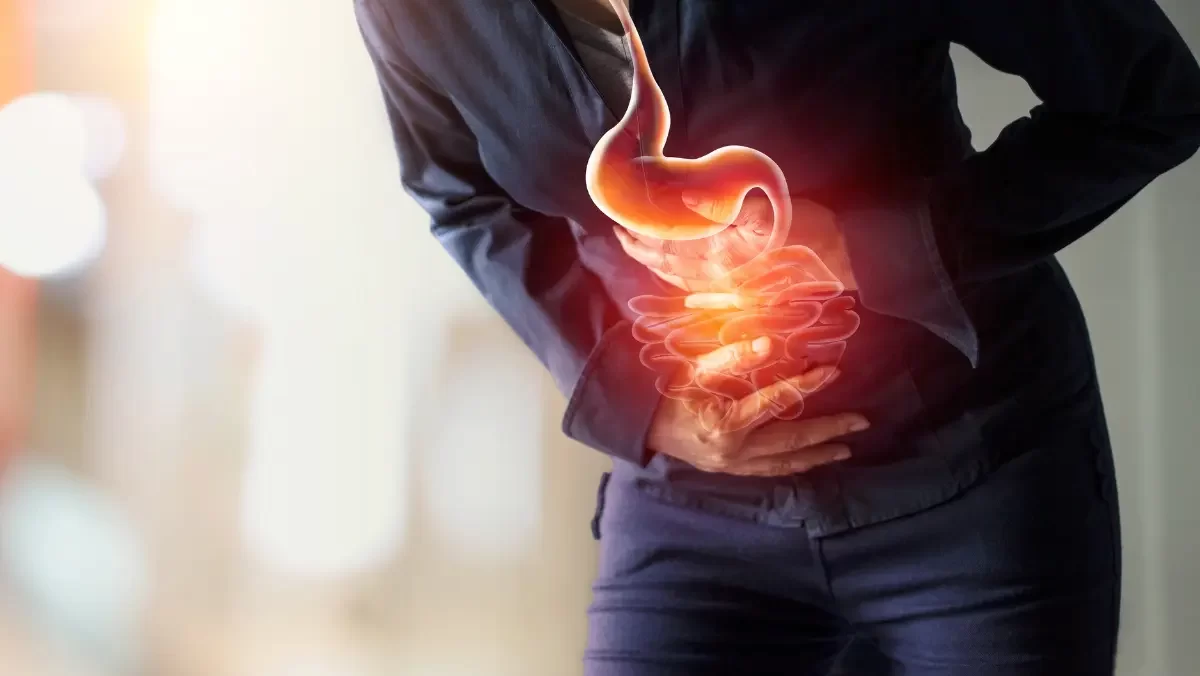A peptic ulcer is an open sore that forms on the inner lining of the stomach or the upper part of the small intestine. It occurs when the protective mucus layer is worn away by stomach acid, leading to tissue damage. Peptic ulcers can be classified as gastric ulcers (in the stomach) or duodenal ulcers (in the small intestine). If left untreated, they can lead to serious complications, but with timely peptic ulcers treatment in Chennai, recovery is achievable.
Peptic Ulcer Disease
Peptic ulcer disease (PUD) refers to ulcers that form in the digestive tract, particularly in the stomach and duodenum (the first part of the small intestine). The primary cause of PUD is an imbalance between the digestive acids and the protective mechanisms that safeguard the stomach lining. This imbalance can result from various factors, including infections, prolonged use of nonsteroidal anti-inflammatory drugs (NSAIDs), and excessive alcohol consumption. Helicobacter pylori, a type of bacteria, is responsible for a large percentage of cases, as it weakens the stomach’s protective barrier. PUD can lead to bleeding, perforations, and blockage, all of which can cause severe health problems.
Causes
Peptic ulcers typically result from an imbalance between digestive acids and the protective lining of the stomach or intestine. One of the most common causes is Helicobacter pylori (H. pylori) infection, a bacterium that damages the mucous coating and allows acid to irritate the lining. Another major cause is the long-term use of nonsteroidal anti-inflammatory drugs (NSAIDs) such as ibuprofen or aspirin, which interfere with the stomach’s ability to protect itself from acid.
Stress and spicy foods were previously thought to cause ulcers, but current research indicates they may only aggravate existing ulcers. Smoking and alcohol consumption can also increase ulcer risk by irritating and inflaming the stomach lining. Rarely, a condition called Zollinger-Ellison syndrome causes excessive stomach acid production, resulting in ulcers.
Other contributing factors include:
- Excessive caffeine intake, which may increase stomach acid production.
- Genetic predisposition, with some people being more prone due to family history.
- Underlying liver, kidney, or respiratory diseases that alter digestive functions.
Choosing timely and accurate peptic ulcers treatment in Chennai is essential to address the root causes and prevent progression. This also helps reduce the peptic ulcer treatment cost in Chennai by avoiding complications.
Symptoms
The most common symptom of a peptic ulcer is a burning or gnawing pain in the upper abdomen, usually between meals or during the night. This pain may briefly improve with antacids or eating but often returns. In more severe cases, the pain may radiate to the back or worsen with physical exertion.
Additional symptoms may include:
- Bloating and frequent burping due to increased stomach acid.
- Nausea or vomiting, especially after eating fatty or acidic foods.
- Unexplained weight loss resulting from decreased appetite or fear of eating.
- Heartburn or acid reflux, particularly when lying down after meals.
In more advanced cases, patients may notice:
- Vomiting blood or material that resembles coffee grounds, indicating internal bleeding.
- Black, tarry stools, which suggest bleeding in the gastrointestinal tract.
- Fatigue or shortness of breath due to anemia from chronic blood loss.
Anyone experiencing persistent abdominal discomfort or signs of bleeding should consider immediate peptic ulcers treatment in Chennai. Delays may increase the cost of peptic ulcer treatment in Chennai and lead to severe health issues.
Diagnosis
A thorough clinical evaluation and diagnostic testing are necessary to confirm a peptic ulcer. Initially, a physician may conduct a physical examination and take a detailed medical history, including information on medication use, symptoms, and family history.
The following diagnostic methods are commonly used:
- Upper Endoscopy (Gastroscopy): A thin tube with a camera is inserted through the mouth to examine the stomach and duodenum. This allows direct visualization of the ulcer and potential biopsy for H. pylori detection.
- Urea Breath Test: This non-invasive test checks for H. pylori by analyzing the carbon dioxide in a patient’s breath after swallowing a urea solution.
- Stool Antigen Test: Detects the presence of H. pylori in stool samples, helping confirm bacterial involvement.
- Barium Swallow X-ray: Involves drinking a contrast liquid and taking X-rays to reveal ulcers or abnormal masses.
Early diagnosis helps determine the best treatment for peptic ulcer in Chennai and reduces the risk of recurrence. If you’re in Arumbakkam, you can opt for reliable peptic ulcer treatment in Arumbakkam centers equipped with advanced diagnostic tools and trained specialists.
Peptic Ulcer Disease Complications
If not treated properly, peptic ulcers can lead to severe and life-threatening complications. One of the most dangerous outcomes is internal bleeding, which may result in vomiting blood or passing black stools. This can lead to anemia and require emergency medical care.
Other complications include:
- Perforation: An untreated ulcer may erode through the stomach or intestinal wall, creating a hole. This condition causes sudden, sharp abdominal pain and can lead to peritonitis, a serious abdominal infection.
- Obstruction: Inflammation or scarring from chronic ulcers can block the digestive tract, making it difficult for food to pass through. Patients may experience persistent vomiting, weight loss, and bloating.
- Penetration: The ulcer can penetrate into adjacent organs like the pancreas or liver, causing intense, referred pain.
- Malignancy: Although rare, some gastric ulcers may become cancerous over time, especially if H. pylori infection persists.
Timely peptic ulcers treatment in Chennai significantly reduces these risks. Delayed intervention not only worsens the condition but also increases the peptic ulcer treatment cost in Chennai. Seeking prompt care at a trusted facility offering the best treatment for peptic ulcer in Chennai is vital for long-term health.
Peptic Ulcer Disease Treatment
Effective treatment of peptic ulcers focuses on eliminating the cause, promoting healing, and preventing recurrence. If the ulcer is due to H. pylori infection, a combination of antibiotics and acid-suppressing medications, such as proton pump inhibitors (PPIs), is usually prescribed.
Core treatment approaches include:
- Antibiotic Therapy: Typically involves two or more antibiotics taken for 10–14 days to eradicate H. pylori.
- Acid Suppression: Medications like PPIs (omeprazole, pantoprazole) or H2-receptor antagonists reduce stomach acid, allowing ulcers to heal.
- Antacids and Cytoprotective Agents: These provide immediate symptom relief and protect the stomach lining from acid.
- Avoiding NSAIDs: Alternative pain relief options are recommended for patients with ulcers caused by NSAID overuse.
In severe or recurrent cases, surgical intervention may be necessary, especially in cases of bleeding, perforation, or obstruction.
Seeking peptic ulcers treatment in Chennai at a reputable facility ensures access to gastroenterologists and specialized care. For those located nearby, peptic ulcer treatment in Arumbakkam provides a convenient option with excellent medical infrastructure. Additionally, understanding the cost of peptic ulcer treatment in Chennai allows for better planning and access to affordable, quality care.
Preventive Measures for Peptic Ulcers
Preventing peptic ulcers involves lifestyle adjustments, medication awareness, and proactive health monitoring. One of the most crucial preventive steps is avoiding or limiting the use of NSAIDs, especially without medical guidance.
Key preventive practices include:
- Limit NSAID Use: Use acetaminophen for pain relief when possible, and consult a doctor before taking NSAIDs long-term.
- Manage Stress: Chronic stress may worsen symptoms or delay healing. Incorporate relaxation techniques such as meditation, deep breathing, or yoga into your routine.
- Quit Smoking and Alcohol: Both contribute to acid imbalance and irritation of the stomach lining, increasing ulcer risk.
- Eat Balanced Meals: Avoid highly acidic or spicy foods and consume smaller, more frequent meals to reduce acid secretion.
- Test for H. pylori: If you have a family history or past symptoms, consider testing and treating H. pylori infections early.
- Medication Compliance: Complete all prescribed medications as directed to ensure proper ulcer healing and to prevent recurrence.
Choosing the best treatment for peptic ulcer in Chennai early helps in reducing recurrence and improving quality of life. Patients seeking convenient care may opt for peptic ulcer treatment in Arumbakkam and inquire about the peptic ulcer treatment cost in Chennai to make informed decisions.
Conclusion
Peptic ulcers are serious yet treatable conditions when diagnosed and managed early. A combination of medical therapy, lifestyle changes, and regular monitoring is essential for complete recovery and long-term prevention. Patients must remain vigilant about symptoms and avoid self-medication. For those in Chennai, peptic ulcers treatment in Chennai is readily available at top-tier hospitals. Prime Indian Hospital offers comprehensive care, experienced gastroenterologists, and tailored solutions that balance affordability with excellence, making it a trusted name for peptic ulcer treatment in Chennai.














